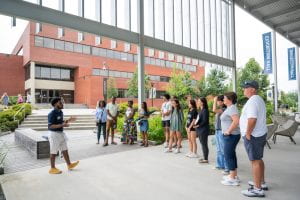Warning: The subtitle of this blog is “That you may not like to hear.” And unlike most of my intros, we’re not going to waste time or words on analogies, personal anecdotes, or admittedly stretched parallels. Instead, after watching this cycle repeat itself, here are the three direct messages/ primary hopes I have for juniors entering the college admission experience.
Don’t apply to a college you would not actually attend. Seniors did this. I know, right? They basically walked into a store looking for jeans and went to the section three sizes up from theirs and were like- “Yea, I’ll put those in my cart just to have a few extra.” Does that sound dumb? It is. Think about it this way- there are 2000+ four-year colleges in America, not to mention the thousands of other post-secondary options around our country and abroad. I’m guessing if someone lined up that many pairs of jeans you could easily find 7 or 9 or 11 that you could afford, fit well, and you would be excited about/proud to wear. Many application fees are $50 or more. Need suggestions for better uses of that money? Donate to a local non-profit, take your mom out to lunch, Venmo me, basically do anything with it except what the seniors just did. Want more details and insight? Check out this podcast with Rachelle Hernandez, vice provost for student affairs at Johns Hopkins University. Not a podcast listener? Ok. Then hear this: Don’t apply to a college you would not actually attend!
The “College Search” is internal. See, the seniors heard “search” and they went looking like a Survivor contestant scouring the island for immunity idols. This ain’t that. How do you know what to plug into a Google search if you haven’t taken time to reflect on what you value, or your hopes and goals for college and life beyond? So, yea. I’m going to be that guy and tell you to get off your phone. Worse still- I’m telling you to go somewhere quiet on your own and really listen to yourself…more than once. And to really go overboard here, maybe even bring a pen and paper and write stuff down about what you really need and want. Again, the subtitle is, “that you may not like to hear.” Promise made- promise kept.
Look. As a talented student and a relatively good person, an annoyingly large number of people are going to have opinions about where and why you should visit, apply, or attend certain schools. Oh… and they’re going to tell you whether you like it or not. At the end of the day, we live in a noisy, busy world. My hope is that you will consistently pull away for a few hours to listen and be honest with yourself. The truth is that these decisions just keep getting bigger- where to apply becomes where to attend. Where to attend becomes what to major in. What to major in becomes job, city, community, family. Oh, yea. I can draw a throughline from today to one far in the distant future based on how you approach this. But hey- you are a junior and we are just on #2, so let’s start with and commit to this. Don’t do what they seniors did! Don’t begin by searching Google with criteria someone else told them was important. Don’t start by looking at rankings or lists of colleges that a marketer developed to sell ads and peddle clicks. The college admission search is internal.
Nothing happens to you in college admission. Read that carefully. I did not say “nothing happens.” Just that nothing happens to you. Now, to be fair to the seniors, this has been a tumultuous and unprecedented year, particularly in light of the FUBAR FAFSA situation, the first cycle following a landmark SCOTUS case, and noise and variance in testing policies around the country.
Still, there was way too much why did this happen to me mentality and not enough why did this happen for me? inquiry. Here’s the truth- next year there will also be change, unexpected events, personal and macro challenges, and general unpredictability. This spring, as admission and scholarship information has come out, a lot of seniors (and their parents) have effectively said: “What did I do wrong?” or “What else could I have done?” or (directly or indirectly) “This whole thing is broken and unfair.” Well, in the spirit of “messages you might not like to hear,” that’s college admission, that’s college, and really that’s life.
As a junior, however, you have a choice. When things don’t go exactly as you hope/plan, i.e. you get deferred, denied, waitlisted, or you don’t receive the amount of money you need to attend a particular school, you can cry/wallow/point fingers/ take your ball and go home OR you can re-frame from why is this happening to me? to why is this happening for me?
Ok. I got deferred. “Why is this happening for me?” Now, I get to decide if I’m still really interested in this school. If so, I get to send my fall grades and submit updated information.
I didn’t get admitted. Or I didn’t get into the honors program. Or that scholarship amount is just not enough to make it affordable… why is this happening for me? Now, I get to pivot. I get to figure out another way or explore a different option. I get to show up somewhere else committed to succeeding, building a network, maximizing my opportunities. Nothing happens to you in college admission.
What messages do we like to hear? I can help you control this. I can make this easier for you. You are special and amazing and it’s all going to work out. I get it. I’m human. That all sounds good to me too. But it is not true (well, you’re kind of special and amazing). And you best believe you can find (often for $$) lots of people who will guarantee you things in college admission. If you see an ad online or have someone approach you claiming to have the magic formula, the secret sauce (or some other noun preceded by a descriptor), RUN!
So, I will not make any guarantees, but I will make you a promise. If you will only apply to places you really want to go and would be excited to attend; if you will begin with asking yourself big and tough questions; and if you will adopt the mindset that the year ahead, while absolutely not predictable or fully in your control, will be one of formation, transformation, growth, discovery, and opportunity; then on the Ides of April 2025, you will have been truly successful in your college admission experience.

 Campus tour guides are only one person and they share generally about most programs on their campus. Your tour guide is going to share information about the overall student experience on their campus, and many times their experiences are going to be similar to other majors.
Campus tour guides are only one person and they share generally about most programs on their campus. Your tour guide is going to share information about the overall student experience on their campus, and many times their experiences are going to be similar to other majors.
 Andrew Cohen joined Georgia Tech in 2018 and currently oversees the guest experience for all Undergraduate Admission visitors. His love for providing visitors with informative, authentic, and personal experiences started as a student tour guide at his alma mater, Ithaca College. Andrew’s passion for the visit experience has led him to his involvement in the Collegiate Information and Visitor Services Association, where he currently services as the President-Elect on their executive board.
Andrew Cohen joined Georgia Tech in 2018 and currently oversees the guest experience for all Undergraduate Admission visitors. His love for providing visitors with informative, authentic, and personal experiences started as a student tour guide at his alma mater, Ithaca College. Andrew’s passion for the visit experience has led him to his involvement in the Collegiate Information and Visitor Services Association, where he currently services as the President-Elect on their executive board.



